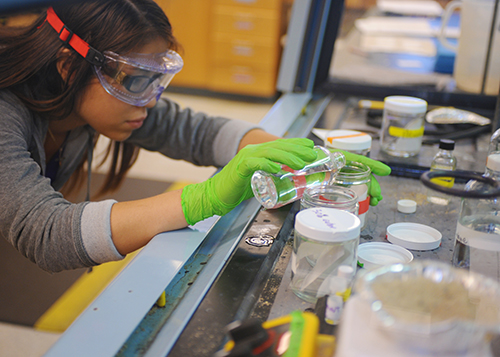Why Choose Consumer Products and Cosmetic Engineering?
This specialized concentration in consumer products and cosmetic engineering brings together a unique set of courses designed specifically to prepare chemical engineering students for a successful entry into this highly competitive and rapidly growing industrial sector. The consumer products and cosmetic engineering concentration is available at both the undergraduate and graduate level for chemical engineering majors. These programs have been approved by the NY State Department of Education.
Our graduates have gone on to work for top consumer products and cosmetic companies, including:
- L’Oreal
- Unilever
- Revlon
- Avon
- Estee Lauder
- Intercos
- Tarte Comsetics
What Will You Learn?
Many consumer products and cosmetics are complex fluids and soft solids that require in-depth understanding and control of the formulation (microstructure- processing-performance linkages), in order to develop and produce highly optimized and differentiated products. This requires specialized knowledge in colloids, surfactants, polymers in addition to an understanding of the rheology, tribology and advanced processing of these complex fluids. Additionally, an understanding of the environmental, regulatory, safety and compliance aspects play a critical role in building up the skills set for a successful entry to this rapidly growing industrial sector.
Coursework
Within the Cosmetic Engineering specialization area, the program offers courses including:
- Formulations I and Formulations II – these two courses develop the knowledge and skill set necessary to conduct effective formulation design and engineering of complex fluids to develop products for the cosmetic and consumer industry.
- Emulsion and Polymer Technologies – this course covers complex fluids with an emphasis on emulsions and polymer technologies including advanced characterization techniques such as rheology and scattering, physicochemical aspects and stability of suspensions, emulsions, surfactants and micelles.
- Advanced Processing Techniques – this course covers the theory of multi phase and reactive flow processes, including non-newtonian and time-dependent flow, heat transfer at boundaries, powder and solids processing, surface forces, phase transitions, ripening and sintering, flow with chemical transformations.
- Industrial Regulations and Quality - this course covers a variety of aspects of regulated and quality-driven industries including regulating authorities, regulatory inventories, applications, compliance, and recalls, quality systems such as Six Sigma, and quality control techniques.
Laboratory/Research Component
Research opportunities are avaialble for undergraduate students to gain hands-on laboratory experience - valuable learning experiences for a career in research and development or pursuit of doctoral degree.
New York City Location
Our New York City location provides opportunities for students to use the city as their classroom - visiting sites, speaking with successful alumni who work in the industry, as well as applying for internships at major cosmetic companies.
Faculty
The affiliated faculty are world-leading experts in the application of chemical engineering, colloid and interface science, environmental engineering and biomolecular engineering for developing and manufacturing the next generation of cosmetic products.
Meet the Faculty
